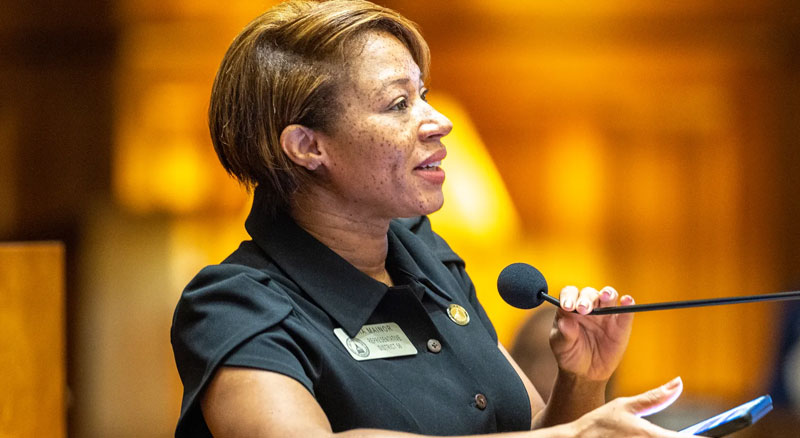Quebec judge awards $25K to Inuk woman ‘forgotten’ by youth protection authorities
In a legal first, a Quebec Court judge has awarded cash compensation of $25,000 to a 19-year-old Inuk woman who was forgotten by the youth protection (DPJ) officials responsible for her care for nearly 15 years.
In the judgment, rendered last November but only made public this week, Judge Peggy Warolin acknowledged there’s no legal precedent for her decision.
“The court concludes that this financial compensation, although imperfect, is the only possible option to correct the injury situation experienced by this teenager for so many years,” Warolin said.
What term can be strong enough to qualify the total absence of followup during all these years? Her situation was completely forgotten and no one cared about her well-being or legal status.– Quebec Court Judge Peggy Warolin
The young woman, who can’t be identified under child protection laws, was born in 2004 and placed in a foster family in 2006 in a village on Hudson Bay. She stayed with that foster family until 2018.
While the judge found that the foster family provided some adequate care during that time, there were instances of substance abuse and domestic violence.
Despite that, for a period of 10 years, from 2006 to 2016, nobody from the DPJ bothered to check on the girl.
The DPJ only became aware of the girl again after being alerted to behavioural problems she was having at school.
And the judge found that even once social workers resumed contact, they spent five more years bungling or ignoring the case.
“What term can be strong enough to qualify the total absence of followup during all these years?” Warolin said.
“Her situation was completely forgotten and no one cared about her well-being or legal status,” she added.
DPJ fails to act despite being alerted to violence, substance abuse
The judgment found that youth protection workers missed a key opportunity to intervene early in the case.
In 2007, police warned the DPJ about the foster father in the home where the girl was living.
Police noted that the father had been imprisoned several times, had several pending criminal files, and that the foster mother was a “regular victim” of domestic violence.
They also noted the foster father had been charged in the past with sexual assault of minors, but it was unclear whether he had been convicted.
“Despite this information, no action is taken, no verification is carried out, nor any intervention,” Warolin said in the decision.
Warolin also noted that the foster family continued to receive financial benefits from the DPJ when no services were being offered to the child.
She described the situation as “beyond comprehension.”
“It’s impossible to explain how a child in such a small environment, where everyone knows each other, could have been so forgotten for so many years,” Warolin said.
She added this was probably not an isolated case.
“Indeed, if the situation of this teenager has been able to pass under the radar during all these years, despite the alerts that have nevertheless arisen at various times, the court is entitled to think that several other children are in the same situation,” she said.
“The living conditions of Inuit children, who have the same right as other little Quebecers to services worthy of the name, should justify giving them all the attention they deserve.”
Decision sets precedent
Typically in cases where courts have found the DPJ negligent in its duties, judges order certain corrective measures to rectify the situation.
These can include appointing a new social worker, offering additional services, paying for therapy, or formally reprimanding the DPJ.
But Warolin found that in this case, none of that was enough.
“How do you correct a situation that has prevailed for 14 years in just a few months? What measure, if it exists, can erase the oversights of the past?” Warolin said.
Warolin decided to accept the suggestion from the child’s lawyer that cash compensation was the answer, both to send a message to the DPJ that such situations are intolerable, and to try to undo some of the damage done to the girl.
“This is a message to the teenager that, although it’s impossible to redo the past, she can count on a little ‘boost’ to forge a better future,” Warolin said.
She suggested the young woman could use the money for therapy or to continue her studies.
Warolin said it was the first time a judge had ordered cash compensation to a person whose rights had been violated by the DPJ.
Decision under appeal
The Nunavik Regional Board of Health and Social Services, which administers youth protection services in the region, is appealing Warolin’s decision.
In a statement emailed to CBC, the board didn’t explain why it was appealing.
“The Director of Youth Protection is personally very sensitive to this type of situation and works together with its teams and the various partners to improve the services offered to children and their families,” the statement said.
The statement notes that despite improvements, youth protection services in the north are facing increasing demand, and that its difficult to recruit Inuit intervenors and professionals.
“It’s important to recognize the complexity of the social problems of Nunavik which persist, and which stem from numerous collective, family and individual traumas,” the statement said.
The girl’s lawyer, Cassandra Neptune, was not available to comment.

